Key takeaways:
- Script development involves crafting a compelling narrative that resonates emotionally and balances a writer’s vision with audience expectations.
- A strong script serves as the backbone of a film, guiding character development and ensuring clarity to avoid audience confusion.
- The script development process consists of key stages: concept development, outlining, drafting, and revising, each critical for enhancing the narrative.
- Flexibility and collaboration are vital in storytelling, allowing for unexpected character evolution and enriching the creative process through diverse perspectives.
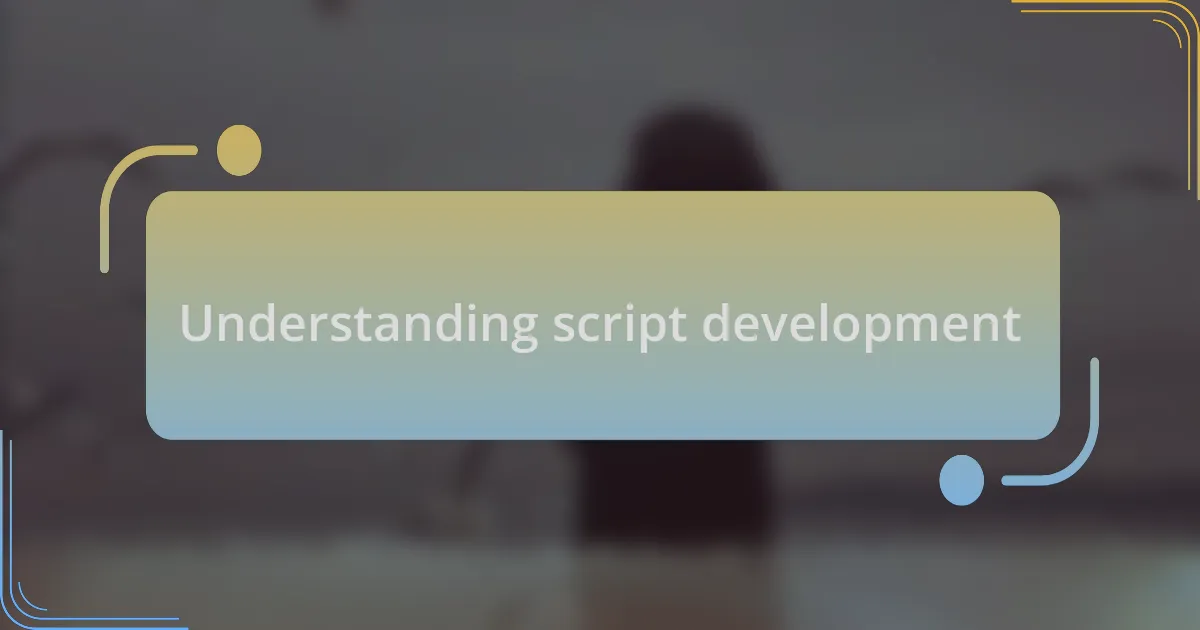
Understanding script development
Script development is more than just writing dialogue; it’s about crafting a compelling narrative that resonates emotionally with the audience. I remember a project where I wrestled with the protagonist’s backstory, attempting to connect her struggles with broader themes of resilience. Have you ever found yourself torn between wanting to tell a gripping story and ensuring it reflects real-life complexities? That’s the heart of script development.
In my experience, a well-developed script can evolve through countless drafts. I recall one script that transformed dramatically over time; what began as a straightforward romantic comedy turned into a poignant exploration of human connection. It’s fascinating how character motivations can shift, leading to unexpected plot twists that breathe life into the script.
Every aspect of script development plays a crucial role, from outlining to character arcs. I often ask myself, how can I make every scene count? This requires not only creativity but also a keen understanding of pacing and structure. It’s a dance between the writer’s vision and the audience’s expectations, ensuring that each moment on screen feels earned and authentic.
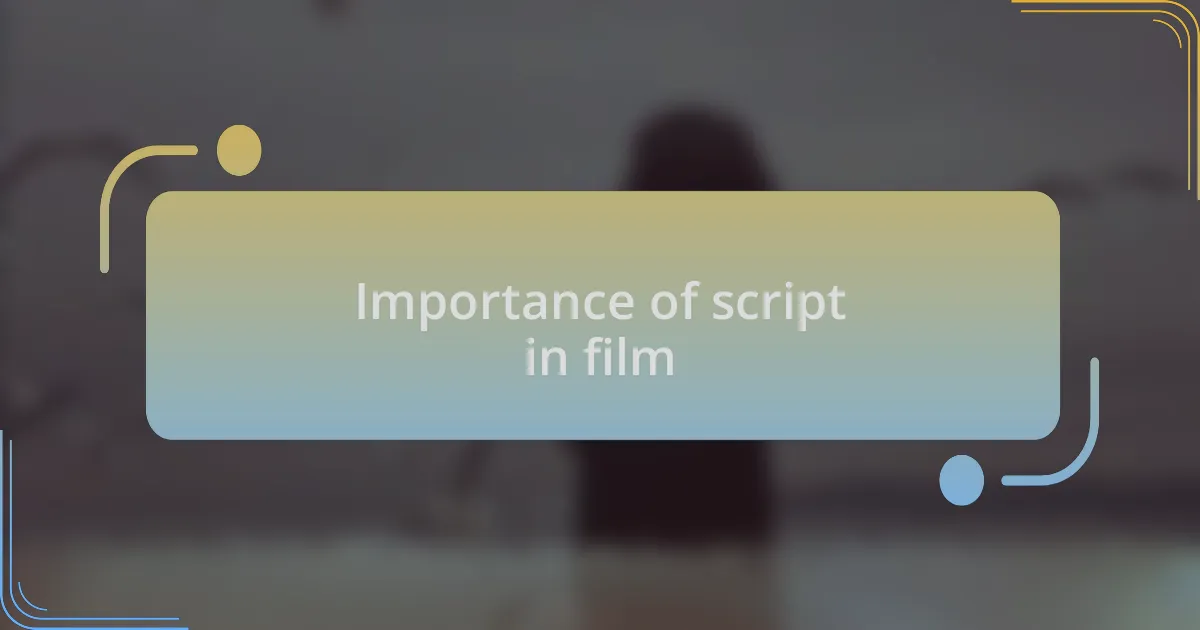
Importance of script in film
The script is the backbone of any film; it dictates the story’s structure, character development, and pacing. I once directed a short film where an early draft left the audience confused about character motivations. It was a humbling moment that reinforced my belief: when a script is lacking clarity, everything else falters. Have you ever watched a film that left you scratching your head? That’s often a sign of a script that didn’t fully connect its dots.
Every line in a script embodies intention and meaning. I recall a scene where a simple exchange between characters turned into a profound moment of revelation. This led me to realize that even subtle dialogue can drive a plot forward while enriching character depth. Questions arise in a viewer’s mind; if the script answers them thoughtfully, it creates a powerful viewing experience.
Moreover, a strong script not only engages the audience but also serves as a crucial communication tool among the production team. In my experience, while prepping for my last film, the script became the reference point for directors, actors, and cinematographers alike. It’s fascinating how a clear script aligns everyone’s vision, transforming abstract ideas into tangible plans. Have you ever thought about how this synergy can elevate a film’s production value?
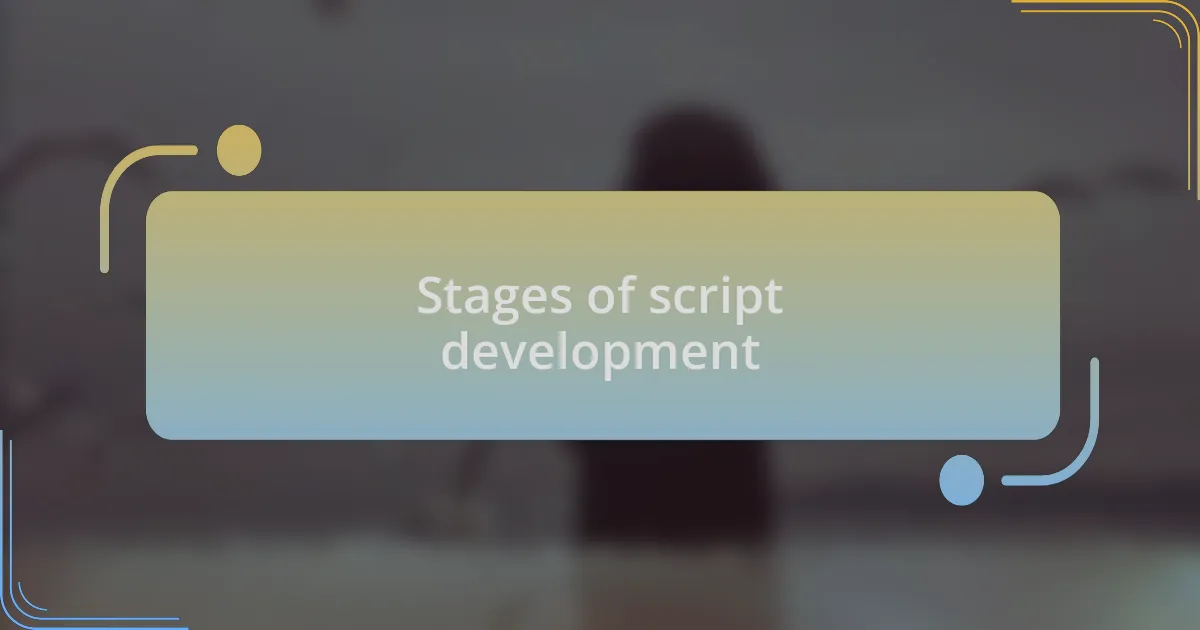
Stages of script development
The script development process typically unfolds in several key stages: concept development, outlining, drafting, and revising. In my journey, I found that starting with a solid concept is crucial. I remember the excitement of brainstorming ideas late at night, uncovering themes and characters that would eventually shape the entire narrative. Doesn’t it feel amazing to build the foundation of a story from just a spark of inspiration?
Once the concept is clear, crafting an outline becomes essential. I often visualize this stage like mapping out a journey; each plot point serves as a milestone that guides the narrative flow. During one of my projects, outlining helped me identify pacing issues before they turned into major problems. Have you ever tried plotting a story and realized midway through that the direction felt off? That’s why a good outline can be a filmmaker’s best friend.
Finally, the drafting and revising phases are where the magic (and sometimes frustration) happens. I remember pouring over drafts, conquering writer’s block, and feeling a rush of satisfaction with every polished page. Revisiting scenes and refining dialogue infused my script with depth, allowing me to share a more authentic experience. How do you approach revising your work? It’s a process that often leads to pleasant surprises, unveiling layers I didn’t realize were there.
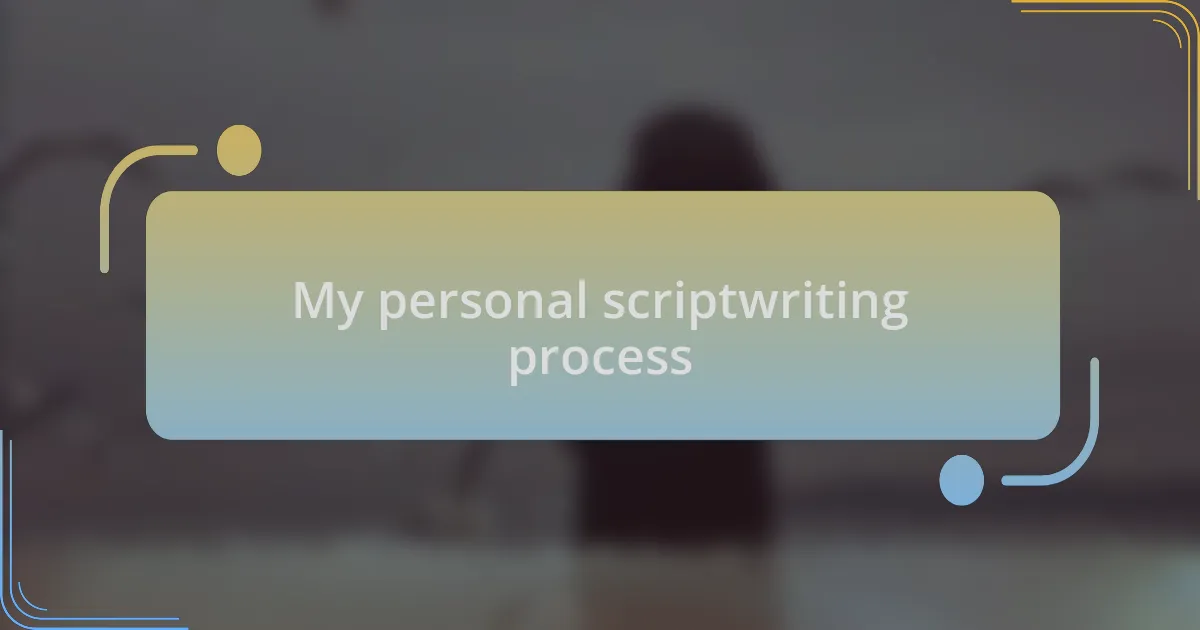
My personal scriptwriting process
When I sit down to write, my first step is diving into character development. I often find myself asking questions about their motivations and backstories. For instance, during one project, I created a character who was grappling with a past mistake. Exploring his inner conflict not only strengthened the narrative but also made the script more relatable. Have you ever felt so connected to a character that their struggles felt like your own?
As I move into drafting, I focus on allowing the characters to drive the story. I recall a time when I let an unexpected plot twist unfold organically because of my protagonist’s decisions. It was liberating! Writing without rigid constraints often opens up new avenues of creativity. Have you experienced that moment when the character seems to take the reins, leading you to places you hadn’t anticipated?
Revising my script is where the real transformation occurs. I often read my work aloud to capture the rhythm and flow of dialogue. It brings me joy to hear the characters’ voices in my head, allowing me to tweak lines for authenticity. I remember a specific scene where a single word change elevated the emotional tone dramatically. In what ways do you find dialogue shapes your narrative? It’s those small adjustments that can breathe life into the story, deepening the connection with the audience.
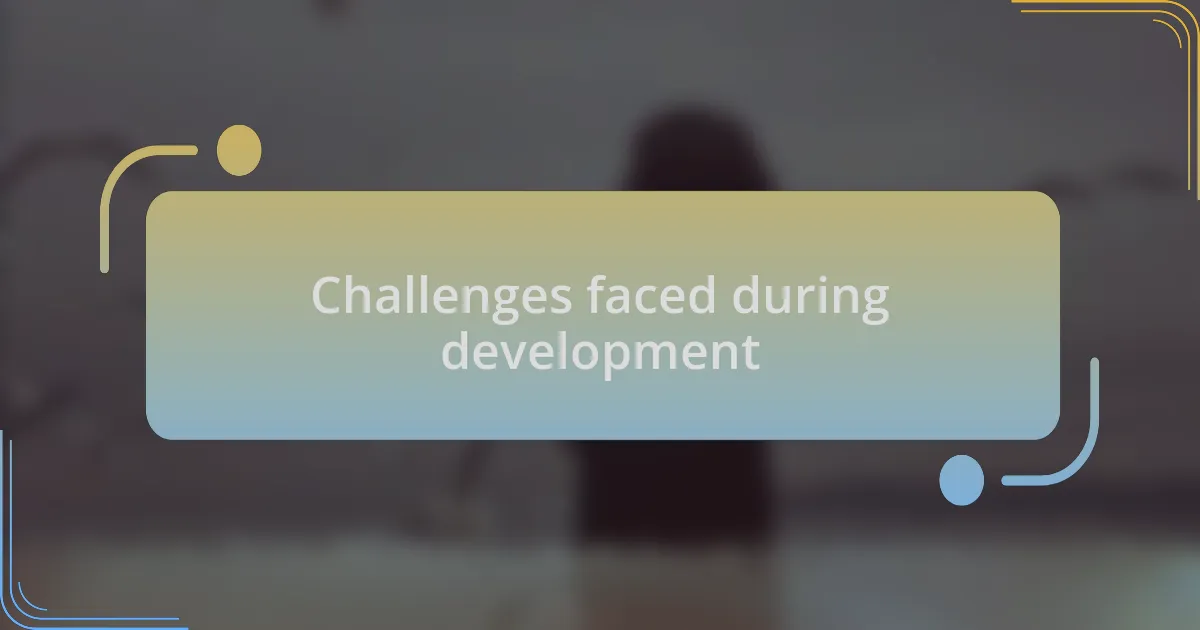
Challenges faced during development
While developing scripts, one of the most significant challenges I’ve faced is balancing my vision with practical constraints, such as budget and location limitations. I remember a particular project where I had an ambitious scene set in a bustling city square. However, the budget didn’t allow for extensive background actors or elaborate set designs. This forced me to rethink the scene and distill it down to its emotional core, which, surprisingly, made it more impactful. Have you ever had to simplify your ideas to elevate their essence?
Another hurdle I often encounter is overcoming writer’s block. There are days when I sit in front of my computer, and no words come out. During one challenging period, I decided to change my environment. I went to a local café, let the sounds of clinking cups and chatter wash over me, and suddenly, inspiration struck. Isn’t it fascinating how a simple change of scenery can reignite creativity?
Feedback can also be a double-edged sword. Receiving critiques from trusted peers is invaluable, but sometimes, their perspectives can pull me in conflicting directions. I vividly recall sharing a draft with a friend who thought the climax was too soft. I found myself questioning the tone I’d crafted and nearly lost sight of my original intent. How do you navigate the delicate balance between staying true to your vision and embracing constructive criticism?

Lessons learned from my experiences
One of the most profound lessons I’ve learned from my script development experience is the importance of flexibility in my storytelling. I remember working on a script where I had a clear idea of the characters’ arcs, but as the story unfolded, I realized that they were evolving in ways I hadn’t anticipated. This made me realize that sometimes, the best narratives come from letting go of rigid plans and allowing characters to speak and act organically. Have you ever noticed how a character can surprise you in unexpected ways?
Another takeaway has been the significance of collaboration. Early on, I tended to see the script as a solitary endeavor, but now I value the insights others can bring. I had the chance to co-write with a friend who had a different style, and this partnership pushed me to explore themes I wouldn’t have touched on alone. How has collaboration shaped your work or creative projects? Partnering with someone who challenges your perspectives can lead to truly authentic and rich storytelling.
Lastly, I’ve realized that completion is an art in itself. In the past, I often got hung up on perfecting every detail before calling a script finished. One time, after countless revisions, I finally submitted a project that I felt was “complete enough.” To my surprise, it was well-received, reinforcing the idea that sometimes we must just take the leap. Have you ever felt the pressure to achieve perfection that nearly paralyzed your progress? Embracing imperfection can be liberating, propelling you forward in your creative journey.
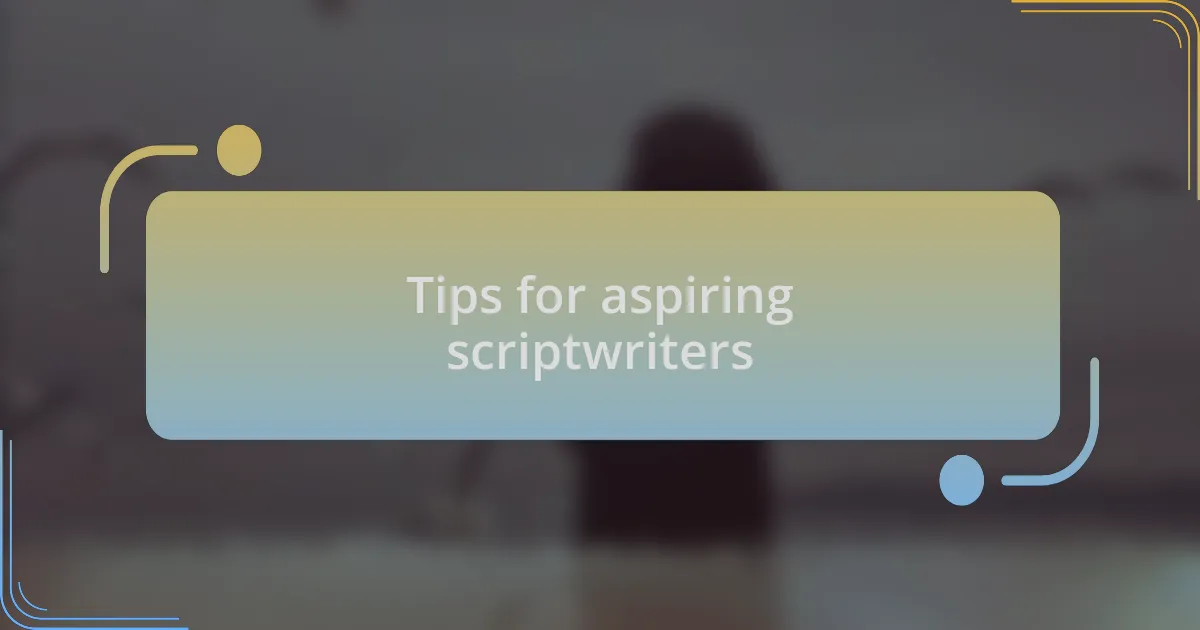
Tips for aspiring scriptwriters
When it comes to scriptwriting, I can’t stress enough the power of reading extensively. I remember diving into a stack of screenplays from various genres—comedy, drama, sci-fi—and each one taught me something unique about structure and dialogue. Have you ever wondered how different writers tackle the same themes? By exposing yourself to diverse voices, you not only sharpen your own skills but also develop a richer understanding of storytelling techniques.
Another tip I would offer is to write every day, even if it’s just for a few minutes. There were times when a busy schedule kept me from pursuing my passion, and I found that even jotting down a thought or a scene sparked my creativity. Have you ever felt that morning rush of inspiration that just begs to be captured? Establishing a routine helps maintain that creative momentum, and soon, those snippets turn into something much larger.
Lastly, don’t shy away from feedback. Early in my career, I dreaded sharing my work with others, fearing judgment. However, after reluctantly sharing a draft with a trusted mentor, I received constructive criticism that completely transformed my script. Isn’t it fascinating how an outsider’s perspective can shine a light on aspects you might overlook? Embracing feedback enhances not just the quality of your writing but also your growth as a writer.